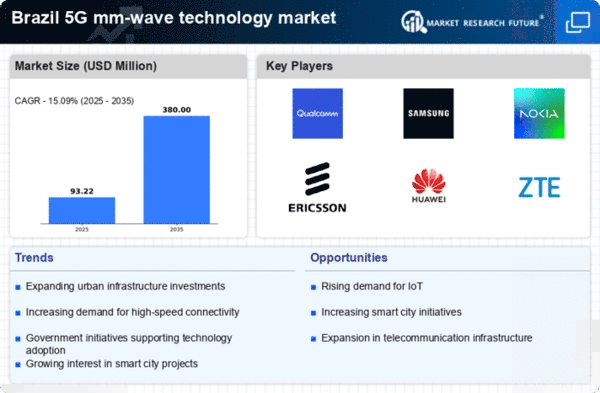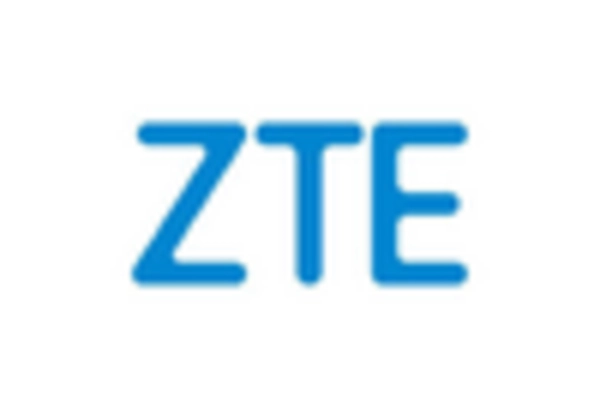Investment in Smart City Projects
Investment in smart city projects across Brazil is emerging as a significant driver for the 5g mm-wave-technology market. Cities such as São Paulo and Rio de Janeiro are implementing smart solutions that require robust and high-speed connectivity. The Brazilian government has earmarked approximately $2 billion for smart city initiatives, which include the deployment of 5g mm-wave technology to support applications like traffic management, public safety, and environmental monitoring. This investment is expected to create a substantial demand for advanced telecommunications infrastructure, thereby propelling the growth of the 5g mm-wave-technology market. As urban areas continue to evolve into smart cities, the integration of 5g mm-wave technology will be crucial for enabling real-time data exchange and enhancing the quality of urban life.
Competitive Landscape Among Telecom Operators
The competitive landscape among telecom operators in Brazil is intensifying, which is likely to drive the 5g mm-wave-technology market. Major players are vying for market share by enhancing their service offerings and expanding their network capabilities. Recent reports suggest that telecom companies are investing over $5 billion in 5g infrastructure to gain a competitive edge. This competition is fostering innovation, as operators seek to differentiate themselves through superior service quality and customer experience. Additionally, partnerships with technology providers are becoming more common, enabling operators to leverage advanced solutions for network optimization. As competition escalates, the 5g mm-wave-technology market is expected to benefit from increased investments and advancements, ultimately leading to improved connectivity solutions for consumers and businesses alike.
Rising Consumer Expectations for Connectivity
In Brazil, consumer expectations for high-speed and reliable connectivity are on the rise, which is a crucial driver for the 5g mm-wave-technology market. As more individuals and businesses demand seamless internet experiences, the need for advanced network solutions becomes apparent. Recent surveys indicate that over 70% of Brazilian consumers prioritize high-speed internet access, which is essential for activities such as streaming, gaming, and remote work. This growing demand is pushing telecom operators to invest in 5g mm-wave technology to meet consumer needs. Additionally, the increasing penetration of smart devices and IoT applications is likely to further fuel this demand, compelling service providers to enhance their network capabilities. Consequently, the 5g mm-wave-technology market is expected to expand as operators strive to deliver superior connectivity solutions that align with consumer expectations.
Technological Advancements in Telecommunications
Technological advancements in telecommunications are playing a pivotal role in shaping the 5g mm-wave-technology market in Brazil. Innovations such as Massive MIMO and beamforming are enhancing the efficiency and capacity of wireless networks, making them more suitable for 5g mm-wave applications. These technologies enable operators to optimize their spectrum usage, thereby improving service quality and reducing latency. According to industry reports, the implementation of these advancements could lead to a 30% increase in network capacity, which is essential for accommodating the growing data traffic in urban areas. As Brazilian telecom companies adopt these cutting-edge technologies, the 5g mm-wave-technology market is likely to experience accelerated growth, driven by the need for enhanced performance and user satisfaction.
Government Initiatives for Digital Transformation
The Brazilian government has been actively promoting digital transformation initiatives, which significantly impact the 5g mm-wave-technology market. With the National Broadband Plan aiming to enhance connectivity across urban and rural areas, the government is investing heavily in infrastructure development. This includes allocating approximately $1 billion for the expansion of broadband services, which is expected to facilitate the deployment of 5g mm-wave technology. Furthermore, the government's commitment to fostering innovation through public-private partnerships is likely to accelerate the adoption of advanced technologies, thereby creating a conducive environment for the growth of the 5g mm-wave-technology market. As a result, the market is poised to benefit from increased funding and support for digital initiatives, which may lead to enhanced service offerings and improved user experiences.
















